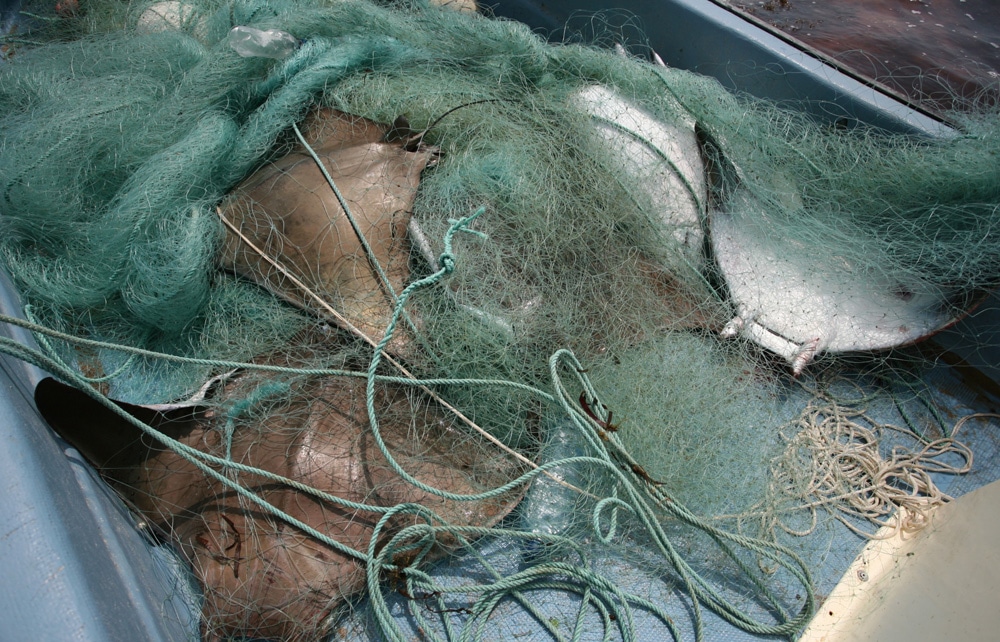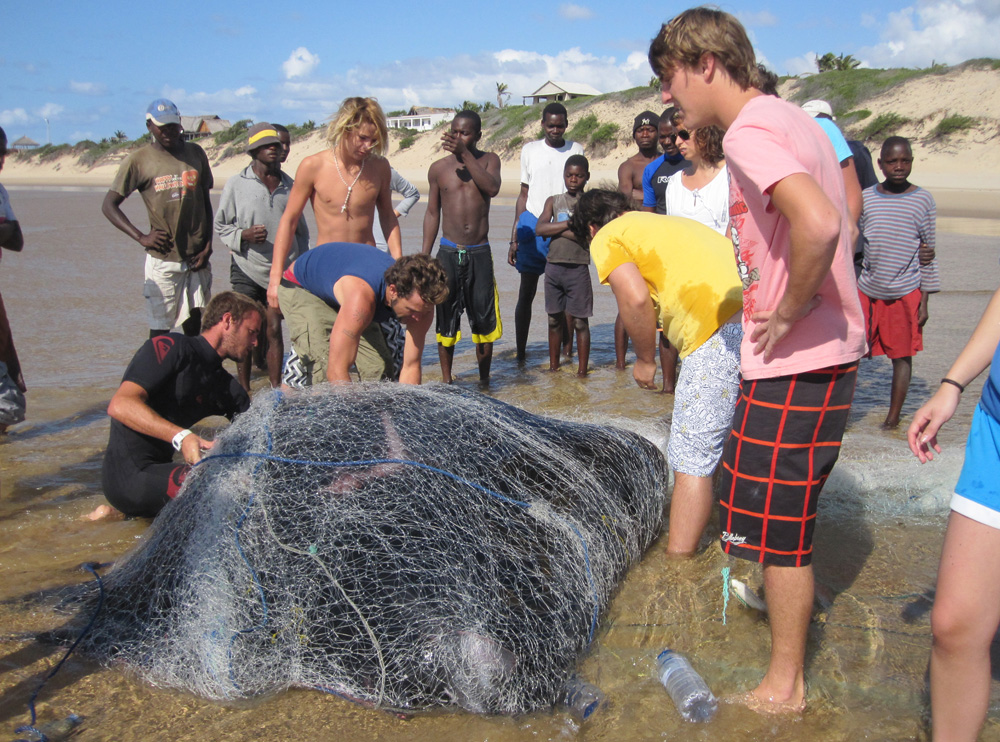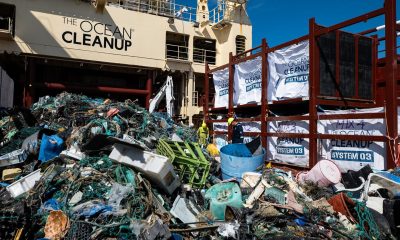Marine Life & Conservation
Mantas and Whale Sharks gain protection under new law in Mozambique
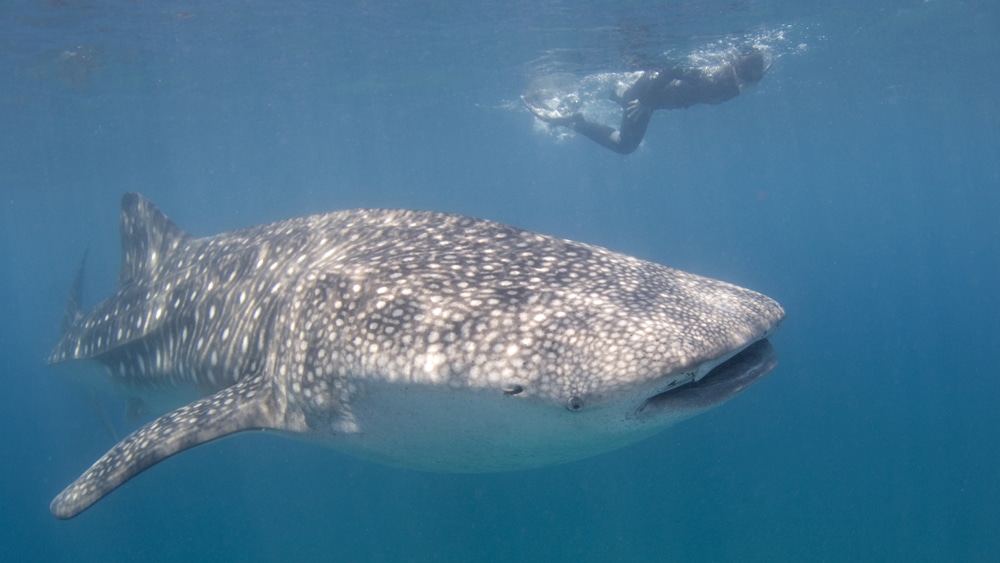
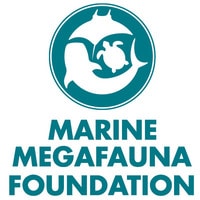 After 20 years of research and lobbying efforts, the Marine Megafauna Foundation (MMF) is thrilled to announce a major legislative victory for ocean life in Mozambique. A new commercial fishing law enacts sweeping protections for several threatened species, including whale sharks, manta rays, and all mobula species.
After 20 years of research and lobbying efforts, the Marine Megafauna Foundation (MMF) is thrilled to announce a major legislative victory for ocean life in Mozambique. A new commercial fishing law enacts sweeping protections for several threatened species, including whale sharks, manta rays, and all mobula species.
This new legislation is a huge step in the right direction for the protection of threatened marine species in Mozambique. MMF commend the Mozambican government for taking these bold steps to protect the region’s breathtaking sea life, while still supporting the local fishing culture and economy.
“This law will make it far easier for our fishing communities to manage their impact by empowering them to create no-take zones and enforce rules limiting the use of gear that is destructive to important coral reef and mangrove habitats,” says MMF Conservation Project Manager Emerson Neves. “This will help us achieve our goal of sustainable fishing for generations to come, so we can both conserve our incredible fish life and allow people to have a stable livelihood and food source.”
The passing of this law is no small feat and has taken years of scientific research and lobbying by NGOs and institutions, including MMF, to highlight the importance of establishing protections for the threatened marine species in the region. MMF are grateful that the government has responded to the data and recommendations of scientists which has led to the formation of these new regulations.
MMF has been researching whale sharks and mobula rays in Mozambique for almost two decades. Their achievements have included the discovery that manta rays are two separate species and the first formal studies of these species in Africa. “The largest identified populations of both reef and giant manta rays in Africa have been identified off the southern Mozambican coastline, making it a critical region for their conservation in the Western Indian Ocean,” explains MMF Co-founder and Principal Scientist, Dr. Andrea Marshall.
MMF has also led groundbreaking research on whale sharks in the region. Their research into the importance of the whale shark habitat in the area and increasing human pressures, such as accidental catch in gill nets, which has halved their global population since the 1980s, helped to justify their inclusion in this new law.
“The Mozambican coast is an internationally important habitat for whale sharks, the world’s largest fish,” elaborates Dr. Simon Pierce, MMF Co-founder and Principal Scientist. “Protection in Mozambican waters provides a safeguard for the species locally, where whale sharks are the basis for sustainable marine ecotourism, but will also help these gentle giants to recover in the broader Indian Ocean. The Mozambique government has taken a commendable step for the worldwide conservation of this endangered species.”
Some of the most crucial and troubling data captured by MMF shows dramatic declines in observational sightings of marine megafauna like manta, mobula rays, and whale sharks. In 2013 they reported a 79% decline in whale shark sightings and an 88% decline in reef manta sightings, and sadly these trends continue. Their data now show declines of over 90% for giant mantas, reef mantas, and shortfin devil rays in the south of the country.
“Evidence of these stark declines, which have been attributed in large part to localized fishing pressure, are a testament to the urgency of these protections which go into effect today,” states Dr. Marshall.
MMF researchers have estimated the economic importance of manta rays and other megafauna to the Mozambican tourism industry, highlighting the economic incentive for their protection. The study, lead-authored by Dr. Stephanie Venables a senior scientist at MMF, illustrated the economic impact of manta ray tourism in the Inhambane province, including $34 million USD per year of direct economic impact of manta ray tourism, and a projected yearly loss of $16-$25 million USD if Mozambique were to lose manta rays.
Healthy populations of megafauna are crucial for maintaining healthy oceans. Manta rays and whale sharks are listed as vulnerable or endangered on the IUCN Red List with declining populations worldwide. Local conservation measures, like this law, are vital for the overall persistence of these species. Every organism plays an important role in an ecosystem, but ocean giants often play vital roles in maintaining balance and regulating resources in their environments. This in turn, naturally keeps fish populations healthy and improves the viability of fishing industries into the future.
In addition to the protection granted to mantas, mobulas, and whale sharks, the law also includes the following new regulations:
- Fishers must land the full body of any sharks caught with fins attached
- New clearer regulations for CCPs (community fishing councils)
- A ban on destructive fishing practices on coral, seagrass, or mangroves
- A ban on the harvesting of live coral
- Bycatch must be thrown back unless you have prior written permission to use it for research
- Turtle excluder devices are mandated on industrial and semi-industrial nets
While this law is a significant breakthrough, a number of other important species were not given protection. “This new protection is a huge step in the right direction and we’re thrilled that Mozambique is recognizing the importance of some of the species we study, but there are other rare and endangered species in Mozambique that still lack protection,” explains MMF Manta Research Manager, Anna Flam.
“We’re hoping to use the positive momentum from this new law, combined with our research, to lobby Mozambique to add protection for hammerhead sharks, smalleye stingrays, leopard sharks, and wedgefish, among other vulnerable species.”
MMF is currently working with other NGOs to submit a list of species that we believe must be added as an amendment to the new law.
For more information about the work of MMF visit their website by clicking here.
Images: Dr. Andrea Marshall
Blogs
The Ocean Cleanup Breaks 10,000,000 KG Barrier

The Ocean Cleanup, the global non-profit project, has removed a verified all-time total of ten million kilograms (22 million lbs.) of trash from oceans and rivers around the world – approximately the same weight as the Eiffel Tower.
To complete its mission of ridding the oceans of plastic, The Ocean Cleanup uses a dual strategy: cleaning up the Great Pacific Garbage Patch (GPGP) to remove the plastic already afloat in the oceans, while stopping the flow of plastic from the world’s most polluting rivers.
Through cleaning operations in the GPGP and in rivers in eight countries, the cumulative total of trash removed has now surpassed ten million kilograms. This milestone demonstrates the acceleration of The Ocean Cleanup’s impact, while underlining the astonishing scale of the plastic pollution problem and the need for continued support and action.
While encouraging for the mission, this milestone is only a staging point: millions more tons of plastic still pollute our oceans and The Ocean Cleanup intends to continue learning, improving and innovating to solve this global catastrophe.
This announcement comes as governments from around the world meet to continue negotiations to develop a new legally binding instrument to end plastic pollution at INC4 in Ottawa, Canada. Representatives of The Ocean Cleanup will be in attendance and the organization will be urging decision-makers to collaborate towards a comprehensive and ambitious global treaty which addresses plastic at all stages of its life cycle and in all marine environments worldwide, including in areas beyond national jurisdiction.
It is encouraging to see that the need for remediation is reflected in the various options for potential treaty provisions. It is essential that the final treaty contains clear targets for the remediation of legacy plastic pollution, and reduction of riverine plastic emissions.
Tackling plastic pollution requires innovative and impactful solutions. The treaty should therefore incentivize the innovation ecosystem by fostering innovations that make maximal use of data, technology and scientific knowledge – such as those designed and deployed by The Ocean Cleanup.
‘After many tough years of trial and error, it’s amazing to see our work is starting to pay off – and I am proud of the team who has brought us to this point.’ said Boyan Slat, Founder and CEO of The Ocean Cleanup. ‘While we still have a long way to go, our recent successes fill us with renewed confidence that the oceans can be cleaned.’
The Ocean Cleanup was founded in 2013 and captured its first plastic in 2019, with the first confirmed catch in the GPGP coming soon after the deployment of Interceptor 001 in Jakarta, Indonesia. After surpassing one million kilograms of trash removed in early 2022, the non-profit project has since progressed to the third iteration of its GPGP cleaning solution, known as System 03, and a network of Interceptors currently covering rivers in eight countries, with more deployments set for 2024.
About The Ocean Cleanup
The Ocean Cleanup is an international non-profit organization that develops and scales technologies to rid the world’s oceans of plastic. They aim to achieve this goal through a dual strategy: stemming the inflow via rivers and cleaning up the legacy plastic that has already accumulated in the ocean. For the latter, The Ocean Cleanup develops large-scale systems to efficiently concentrate the plastic for periodic removal. This plastic is tracked and traced through DNV’s chain of custody model to certify claims of origin when recycling it into new products. To curb the tide via rivers, The Ocean Cleanup has developed Interceptor™ solutions to halt and extract riverine plastic before it reaches the ocean. Founded in 2013 by Boyan Slat, The Ocean Cleanup now employs a broadly multi-disciplined team of approximately 140. The foundation is headquartered in Rotterdam, the Netherlands.
For more information, visit: theoceancleanup.com and follow @theoceancleanup on social media.
Marine Life & Conservation
Steve Backshall to headline Shark Trust’s flagship event: For the Love of Sharks

Join a host of amazing, shark loving, speakers including Steve Backshall and the Shark Trust team for an evening celebrating shark conservation at the Royal Geographical Society in London this November.
Date: 29th November 2024
Time: 6-10pm
Location: Royal Geographical Society, London
Tickets: https://www.sharktrust.org/Event/flos24
The event will be a celebration of all things shark. Those lucky enough to get hold of tickets will hear from engaging guest speakers with a passion for sharks.
The line-up includes (*subject to change if unforeseen circumstances arise)
Steve Backshall: One of television’s busiest presenters, BAFTA award-winning wildlife expert Steve has been passionate about the wild world ever since he was young.
Steve’s impressive TV career has taken him all around the world, investigating a wide array of species and environments. Steve has filmed over 100 hours of children’s wildlife programmes with the BAFTA award winning Deadly 60 franchise and recently, with Sky Nature, for his new series ‘Whale with Steve Backshall’. He has been a patron for the Shark Trust for 10 years.
Simon Rogerson: is a photojournalist specialising in natural history, diving and the sea.
He is editor of SCUBA magazine, the official journal of the British Sub-Aqua Club. Simon started his career as a crime reporter but gravitated towards his ‘less depressing’ interest in underwater exploration, joining the staff of DIVE magazine in 1999. In 2005 he was named ‘Editor of the Year’ in the PPA’s Independent Publishing Awards. Simon also works as a freelance writer, contributing frequently to the Sunday Times and Telegraph, in addition to BBC Wildlife, Esquire, and a host of international diving magazines. He is the author of a book, Dive Red Sea, published by Ultimate Sports. Now based in Berkshire, Simon has been a Patron of the Shark Trust for 20 years.
More speakers to be announced soon. Head to the Shark Trust website to learn more.
The evening will also allow guests the final chance to see the Oceanic 31, shark art exhibition. Some of the artwork will be auctioned/raffled at the event, while the rest will be auctioned online to raise money for the Shark Trust Oceanic Programme.
For the Love of Sharks is an evening with something for everyone who is interested and fascinated by sharks. Join the Shark Trust, their Patrons, Trustees and Staff, along with a host of supporters for this celebration of shark conservation.
For more information or to buy a ticket: https://www.sharktrust.org/Event/flos24
-

 News3 months ago
News3 months agoCapturing Critters in Lembeh Underwater Photography Workshop 2024: Event Roundup
-

 Marine Life & Conservation Blogs3 months ago
Marine Life & Conservation Blogs3 months agoCreature Feature: Swell Sharks
-

 Blogs2 months ago
Blogs2 months agoMurex Resorts: Passport to Paradise!
-

 Gear Reviews3 weeks ago
Gear Reviews3 weeks agoGEAR REVIEW – Revolutionising Diving Comfort: The Sharkskin T2 Chillproof Suit
-

 Blogs2 months ago
Blogs2 months agoDiver Discovering Whale Skeletons Beneath Ice Judged World’s Best Underwater Photograph
-

 Gear Reviews3 months ago
Gear Reviews3 months agoGear Review: Oceanic+ Dive Housing for iPhone
-

 News2 months ago
News2 months agoPADI Teams Up with Wellness Brand Neuro to Drive Ocean Change and Create a Blue State of Mind
-

 Marine Life & Conservation2 months ago
Marine Life & Conservation2 months agoSave the Manatee Club launches brand new webcams at Silver Springs State Park, Florida


